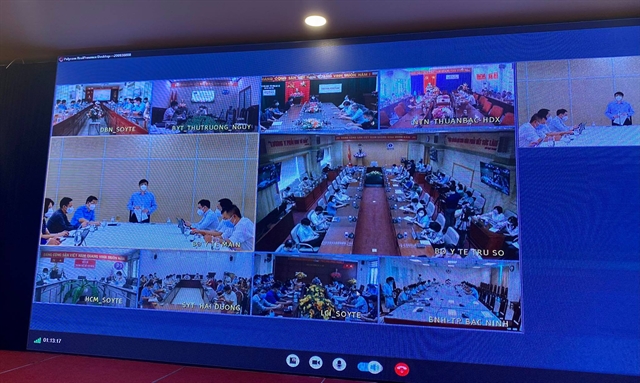 Society
Society


|
| The health ministry organised an online meeting on COVID-19 treatment on Monday, bringing together health authorities from across the country. — Photo suckhoedoisong.vn |
HÀ NỘI — Responding to the COVID-19 pandemic requires fast, drastic and long-term measures, however, many localities are unprepared for the worst, Minister of Health Nguyễn Thanh Long said yesterday.
Chairing an online national meeting on COVID-19 treatment, Long said that it was difficult for Việt Nam to curb the national daily infection numbers as the pandemic continued to hit major cities and provinces hard.
He said that at this time, localities must work harder to avoid panic and unpreparedness when outbreaks become more severe.
Long said he appreciated the efforts and initiatives that localities had made in COVID-19 prevention and control.
However, he said that he saw a number of localities that were failing to prepare for the spread of the virus properly.
“Many localities have developed plans that don’t take into account all possibilities despite the health ministry warning many times about the speed at which the Delta variant can spread and the difficulties in controlling it,” Long said.
He added that localities did not take advantage of their available resources and fully engage with the ‘Four onsite’ concept. This requires having onsite leadership, onsite human resources, onsite materials and supplies, and onsite logistics to control and prevent COVID-19 from spreading in their geographical jurisdiction.
In the ongoing fourth wave of the pandemic, the infections are growing faster in a much shorter time. Comprehensive preparation is an important factor to help localities respond in a timely manner to developments in outbreaks of the disease, he said.
Medical testing and treatment capacity is struggling to catch up with the speed of new infections in some localities. Many are relying on existing health facilities that failed to meet demand even before the pandemic, Long said.
The health minister emphasised the need to classify COVID-19 cases and send them to suitable treatment areas, which could help reduce the workloads of both medical workers and healthcare facilities.
According to the ministry’s guidelines, patients positive to SARS-CoV-2 that have no COVID-19 symptoms should be under health monitor at concentrated quarantine areas as they require the support of fewer medical professionals.
The asymptomatic patients could leave the treatment areas after seven days if they tested negative to SARS-CoV-2 and the viral load in their body was proven to be unable to infect others.
Patients with mild symptoms should be placed at district-level health facilities. The facilities should also have an oxygen supply and ventilators to serve patients if needed, Long said.
In cases where the patient’s health condition becomes worse, they must be taken to health facilities at a higher level, for example, provincial/national hospitals or field hospitals with intensive care units.
Classifying, transporting and receiving patients must be done professionally, systematically and smoothly, Long said.
The minister once again called on medical workers from both private and public health facilities to join the disease prevention and control effort.
All localities, including those that are virus-free, must review their medical human resources, especially those with ventilators, those that can work with patients with mild symptoms, and those who can work with the seriously ill, Long said.
He asked that all COVId-19 treatment facilities prepare proper oxygen and ventilators to meet demand.
The health minister said that Việt Nam currently did not face any shortage of oxygen for treatment but some health facilities did not have a proper tank to store oxygen while others faced difficulties in the transportation of oxygen.
These issues must be reviewed and tackled as soon as possible, he said. VNS




